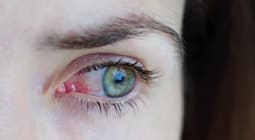What is Conjunctivitis?
Conjunctivitis, more commonly known as “pink eye,” occurs when the conjunctiva (the thin, transparent membrane that covers the white of the eye) becomes irritated and inflamed. The inflammation causes the delicate blood vessels in the eye to dilate, creating the blood-shot look that gives pink eye its name.
Conjunctivitis Forms
Conjunctivitis has three main forms: allergic, bacterial, and viral. Each type has a different root cause.
Allergic conjunctivitis is triggered by allergens such as dust or pet dander. This form of conjunctivitis is not contagious, and can typically be controlled using antihistamines.
Bacterial conjunctivitis is caused by a bacterial infection and is typically spread through unclean hands, makeup, or contaminated contact lenses. Treatment includes antibiotics, which can be prescribed by your optometrist. Bacterial conjunctivitis is highly contagious, so you should stay home from work or school until it has completely cleared.
Viral conjunctivitis is caused by a virus. Like the common cold, early treatments for viral conjunctivitis can greatly help reduce their severity, and should clear up in a few days. This form of conjunctivitis is highly contagious, so you should avoid crowds until it has completely resolved. Viral conjunctivitis typically occurs in conjunction with an upper respiratory infection.
If you suspect that you or a family member has conjunctivitis, you should make an appointment with your optometrist right away.
Conjunctivitis Symptoms
Individuals with conjunctivitis may experience some or all of the following symptoms:
- Pink discolouration on the whites of the eyes
- Swollen eyelids
- Itchy eyes
- Burning eyes
- Increased sensitivity to light
- Excessive tearing
- Watery, stringy, and/or sticky yellow discharge from the eyes
Conjunctivitis Prevention & Treatment
Viral and bacterial conjunctivitis can be prevented by:
- Washing your hands thoroughly and frequently with soap and water
- Using hand sanitizer after spending time in public spaces, particularly at school or work
- Never sharing contact lenses or contact lens cases
- Avoiding rubbing your eyes when you have a cold or flu
- Not sharing personal items such as towels, facecloths, tissues, eye makeup, or fake eyelashes
- Keeping frequently used surfaces, such as countertops and doorknobs clean using antibacterial cleaners
- Staying home from work or school if you have viral or bacterial conjunctivitis so that you avoid spreading it to others
If you have already been diagnosed with bacterial or viral conjunctivitis, there are a few things you can do to prevent it from spreading to others:
- Avoid touching or rubbing your eyes
- Wash your hands frequently with soap and water, especially after applying eye drops or ointment
- Gently wash away discharge from your eyes several times each day using a disposable tissue or cotton ball. If you need to use a towel, make sure you don’t allow it to contaminate any surrounding areas (such as the countertop) and wash it using hot water and detergent. Never reuse a towel or face cloth without washing it first.
- Wash your pillowcase, blankets, and sheets frequently using hot water and detergent
- Throw away and replace all makeup, fake eyelashes, contact lenses, and contact lens cases that you used prior to developing and while you had conjunctivitis. This will prevent you from inadvertently reinfecting yourself.
For more information about conjunctivitis, including treatment options, please speak to your optometrist during your next appointment.















